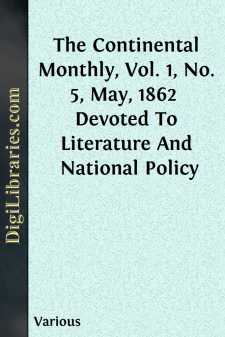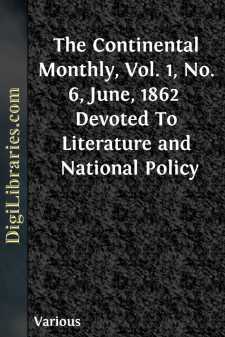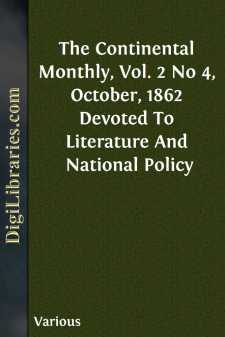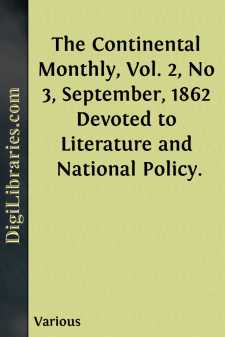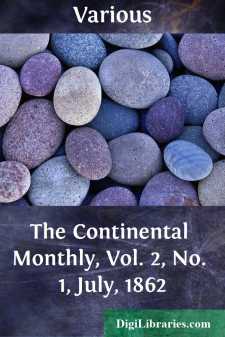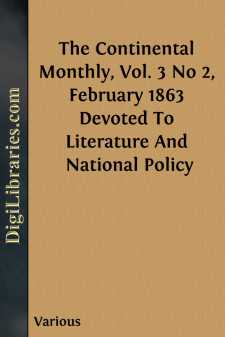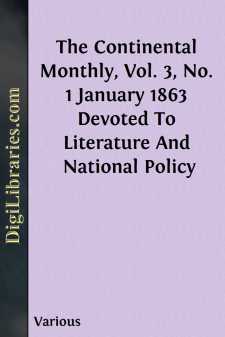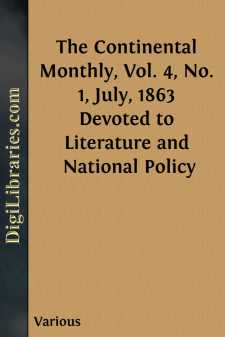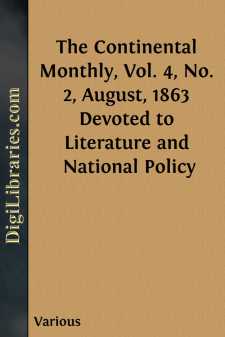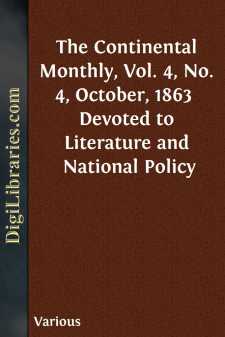Periodicals
- Art 27
- Children's periodicals 59
- Entertainment 5
- Food/Wine 2
- Games/Humor 455
- General 661
- Health 1
- History 53
- House/Home 1
- Regional 62
- Science/Nature 118
- Transportation 10
Periodicals Books
Sort by:
by:
Various
What Shall We Do With It? The first blood that was shed in our Revolutionary struggle, was in Boston, in March, 1770. The next at Lexington, in June, 1775. The interval was filled with acts of coercion and oppression on the one side and with complaints and remonstrances on the other. But the thought of Independence was entertained by very few of our people, even for some time after the affair at...
more...
by:
Various
THE CONSTITUTION AND SLAVERY. There are two sections of the United States, the Free States and the Slave States, who hold views widely different upon the subject of Slavery and the true interpretation of the Constitution in relation to it. The Southern view, for the most part, is: 1. The Constitution recognizes slaves as strictly property, to her bought and sold as merchandise. 2. The Constitution...
more...
by:
Various
'THE CONSTITUTION AS IT IS—THE UNION AS IT WAS.' This has been a pet phrase, in certain quarters, ever since the rebellion broke out. The men who use it are doubtless well aware of the prodigious power of such cries adroitly raised. The history of their influence over the unreflecting masses in all ages would be one of the most curious chapters in the history of human nature. The phrase has...
more...
by:
Various
HENRY THOMAS BUCKLE. The death of Henry Thomas Buckle, at this period of his career, is no ordinary calamity to the literary and philosophical world. Others have been cut short in the midst of a great work, but their books being narrative merely, may close at almost any period, and be complete; or others after them may take up the pen and conclude that which was so abruptly terminated. So it was with...
more...
by:
Various
WHAT SHALL BE THE END? If we look to the development of slavery the past thirty years, we shall see that the ideas of Calhoun respecting State Sovereignty have had a mighty influence in gradually preparing the slave States for the course which they have taken. Slavery, in its political power, has steadily become more aggressive in its demands. A morbid jealousy of Northern enterprise and thrift, with...
more...
by:
Various
OUR NATIONAL FINANCES. Our national finances are involved in extreme peril. Our public debt exceeds $720,000,000, and is estimated by the Secretary of the Treasury, on the 1st of July next, at $1,122,297,403, and on the 1st of July, 1864, at $1,744,685,586. When we reflect that this is nearly one half the debt of England, and bearing almost double the rate of interest, it is clear that we are...
more...
by:
Various
THE HUGUENOTS OF NEW ROCHELLE. It is worthy of record that Westchester County, New York, was settled by emigrants from New England and France, and both seeking homes from religious persecutions. As early as 1642, John Throcmorton, with thirty-five associates, made the first settlement in this section, with the approbation of the Dutch authorities. With Roger Williams, driven away from New England by...
more...
by:
Various
EMANCIPATION IN JAMAICA. The luminous summary of statistical facts published in the March number of the Atlantic Monthly for 1862, has, in a few pages, conclusively settled the question whether emancipation in the smaller islands of the British West Indies has been a success or a failure. It applies the standard of financial results, which, though the lowest, is undoubtedly the best; for the defenders...
more...
by:
Various
OUR FUTURE. In these exciting times, when our country is enduring the throes of political convulsion, and every time-honored institution, every well-regulated law of society seems tottering from the broad foundation of the past, how few are there who ask themselves the question, What is to be our future? For the past two years we have lived in a state of extraordinary and unnatural excitement, beside...
more...
by:
Various
THE FREEDOM OF THE PRESS. An important discussion has arisen since the commencement of the war, bearing upon the interests of the American Press. The Government has seen fit, at various times, through its authorities, civil and military, to suppress the circulation and even the publication of journals which, in its judgment, gave aid and comfort to the enemy, either by disloyal publications in...
more...


